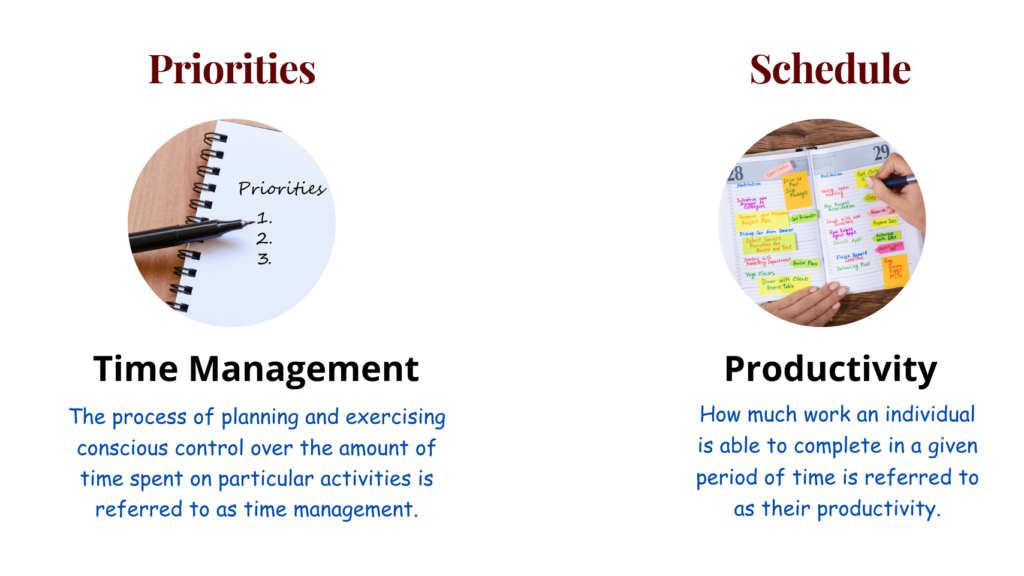Amelia's story
Amelia sat at her cluttered desk, staring blankly at the pile of textbooks, assignments, and a looming deadline for her research paper. The clock ticked mercilessly, each passing minute seeming to mock her mounting stress. She felt overwhelmed, juggling classes, extracurricular commitments, and personal responsibilities. It was a familiar scenario for many students.
But then something changed.
Amidst the chaos, Amelia stumbled upon a quote that resonated deeply: “You have as many hours in a day as Beyoncé.” It was a simple yet powerful reminder that time, the most precious resource, is democratically distributed to all.
Embarking on her quest to reclaim control over her time, Amelia plunged into the world of productivity. She experimented with schedules, tested different study methods, and sought advice from mentors. Slowly but steadily, she began to witness a transformation.
As she implemented strategic planning and adopted effective time management techniques, Amelia found herself navigating through her tasks with a newfound sense of purpose. The overwhelming to-do lists became structured plans, and the ticking clock became an ally in her journey toward productivity.
In this blog, we invite you to embark on a similar journey—a journey to embrace time, to wield it as a tool for academic success, personal growth, and overall well-being.
Two things that students tend to focus more on mastering to set themselves apart from the rest are productivity and time management.
And the catch here is that both time management and productivity go hand in hand.
If you manage your time effectively, you become more productive and efficient.
To get the most out of both, we have divided time management and productivity into two sections.

Let’s dive deep into understanding and mastering “Time” and use it as a tool to enhance our “Productivity”
Understanding Your Priorities (Time Management)
It can seem tough to strike a balance between school, job, play, and social life. The thought of finishing everything on your list might be daunting, and there never seems to be enough time in the day to get everything done.
It is at this point that you should establish your priorities correctly.
Organizing your tasks and streamlining your life with a few simple steps will help you find the key to managing your priorities.
Define Your Goals
Begin by setting clear, achievable goals for both the short and long term. What do you aim to achieve academically, personally, and professionally? Having specific goals provides direction and allows you to focus your efforts.
Take some time to reflect on what is truly important to you and what you want to achieve in the short and long term. This will help you prioritize your tasks and allocate your time accordingly.
Tip💡- Break down your goals into smaller, manageable tasks to make them more achievable and easier to tackle.
Identify Academic Commitments
Once you have defined your goals, the next thing is to identify your academic commitments.
This includes understanding the courses and assignments you need to complete, as well as any extracurricular activities or responsibilities related to your education. By identifying these commitments, you can better manage your time and ensure that you are able to prioritize and allocate enough time for each task.
Tip💡- Prioritize tasks based on deadlines and importance to ensure you allocate time efficiently.
Assess Personal Aspirations
Consider what you hope to achieve outside of your academic goals, such as personal hobbies, career aspirations, or personal development.
Understanding your personal aspirations will help you align your academic commitments with your overall goals and ensure that you are dedicating time and energy to the things that truly matter to you.
Tip💡- Balance is key—prioritize activities that align with your long-term goals and interests.
Evaluate Time Commitments
Take a close look at your current schedule and assess how much time each task or commitment requires.
This will help you determine if you have enough time to dedicate to your personal aspirations alongside your academic responsibilities.
Moreover, consider the potential impact of each commitment on your overall well-being and mental health, as it is important to maintain a healthy balance between academics and personal pursuits.
Tip💡- Some tasks may demand more attention or have stricter deadlines. Understand the effort required for each task to manage your time effectively.
Determine Core Values
Don’t do tasks just for the sake of doing them. Understand that these tasks are something you wanted to do and would help you achieve your long-term goals.
This forms your core values for any task and ensures that you are truly invested in the commitments you take on. By aligning your tasks with your core values, you will feel more motivated and fulfilled when completing them, leading to a greater sense of satisfaction and success.
Consider your core values and what truly matters to you in life. Reflect on what brings you joy, fulfillment, and a sense of purpose. This will help you prioritize your personal aspirations and align them with your values, ensuring that you are dedicating time to what truly matters to you.
Tip💡- Remember to regularly reassess your core values as they may evolve over time, allowing you to make informed decisions about which commitments are worth pursuing.
Assess Impact and Importance
Assess the impact and importance of your commitments. Consider how each commitment contributes to your overall goals and values.
Evaluate whether a commitment aligns with your long-term aspirations and has a significant impact on your personal growth and fulfillment.
This will help you prioritize your commitments and ensure that you are dedicating your time and energy to those that truly matter in the bigger picture of your life.
Tip💡- Be mindful of any commitments that may have a negative impact or detract from your overall well-being and focus on positive high-impact tasks.
Adapt and Review
Regularly assess and reassess your commitments to ensure they are still in line with your evolving goals and values. As circumstances change, be willing to adapt and make necessary adjustments to your commitments.
By regularly reviewing and evaluating your commitments, you can ensure that you are staying on track towards achieving what truly matters to you in the long run.
Remember, it’s okay to let go of commitments that no longer serve a purpose or hinder your personal growth.
Tip💡- Priorities can change. Be flexible and open to adjusting your schedule accordingly.
Building a Strong Schedule (Productivity)
Time is a valuable asset, especially for students juggling classes, assignments, and extracurricular activities.
Constructing a robust schedule empowers you to maximize your time efficiently. Here’s how to build a strong schedule tailored to your student life:
Start with a Calendar or Planner
Using a calendar or planner allows you to visually see your commitments and deadlines, helping you stay organized and on track.
Consider using a digital calendar or a physical planner, whichever works best for you.
Allocate Time Blocks for Study Sessions
Allocate specific time blocks in your schedule dedicated solely to studying. This will help you prioritize your academic responsibilities and ensure that you have designated periods of focused learning.
Try to schedule these study sessions during times when you are most alert and energized, as this will enhance your ability to retain information and complete tasks efficiently.
Break Down Tasks and Assignments
Break down larger tasks and assignments into smaller, more manageable chunks. This will make them feel less overwhelming and easier to tackle.
Breaking tasks down allows you to set specific goals and track your progress, providing a sense of accomplishment as you complete each smaller task.
Use Time Blocking Technique
Use the time-blocking technique to allocate specific blocks of time for different activities and tasks. This technique helps you stay organized and focused by dedicating uninterrupted periods for studying, completing assignments, and taking breaks.
By visually mapping out your schedule, you can prioritize your tasks and ensure that you are utilizing your time effectively.
Include the Buffer Time
Calculate the buffer time by estimating how long each task will take and adding extra time for unexpected interruptions or delays. This will help you avoid feeling overwhelmed or rushed, and allow for flexibility in your schedule.
Having buffer time can also help reduce stress and increase productivity, as you have a cushion to handle any unforeseen circumstances that may arise.
Prioritize Health and Breaks
Remember to prioritize your health and well-being by scheduling regular breaks throughout your day. Taking short breaks can help refresh your mind and prevent burnout, ultimately improving your overall productivity.
Also, make sure to incorporate time for exercise and meditation or other activities that promote physical and mental well-being. This will help you maintain a healthy work-life balance and ensure that you are able to perform at your best.
PS: The following section will provide more information on the subject.
Avoid Overcommitting
Avoid overcommitting yourself by carefully assessing your workload and setting realistic expectations for what you can accomplish. It’s important to recognize your limits and communicate them effectively to avoid taking on too much and becoming overwhelmed. Learn to say “NO” when necessary to protect your time and energy for tasks that truly align with your priorities and goals.
Refraining from Procrastination
Avoiding procrastination is crucial for maintaining productivity and reducing stress. By tackling tasks promptly and efficiently, you can prevent them from piling up and causing unnecessary pressure.
Implementing effective time management strategies, such as breaking larger tasks into smaller, manageable chunks, can also help in staying on track and avoiding the temptation to procrastinate.
Moreover, following the best practices to prevent student procrastination can lead to improved academic performance and overall success.
Incorporate Review and Revision Time
Allocate review and revision time into your schedule to ensure that you are able to thoroughly assess and improve your work. This will help you catch any errors or areas for improvement, ultimately leading to higher-quality outcomes.
Customize Your Schedule
Tailor your schedule to fit your unique needs and preferences. Consider factors such as your peak productivity times, personal commitments, and preferred work methods. By creating a schedule that aligns with your individual circumstances, you can optimize your efficiency and effectiveness in completing tasks.
Regularly Update and Evaluate
Continuously review and update your schedule to accommodate any changes or new priorities that may arise. This will help you stay organized and ensure that you are allocating your time effectively.
Regularly evaluating your progress and identifying any areas where adjustments can be made will help to further improve your productivity and overall performance
Bonus
Balancing Studies and Self-Care
As a student, achieving academic success is crucial, but equally important is maintaining your well-being. Here’s how to strike a balance between studies and self-care:
Prioritize Self-Care
Make sure to prioritize activities that promote your physical and mental well-being, such as exercise, getting enough sleep, and taking breaks to relax and recharge. Remember that taking care of yourself is essential for maintaining focus and productivity in your studies.
“Understand that self-care is not a luxury but a necessity.”
Practice Mindfulness and Stress Reduction Techniques
Engaging in mindfulness and stress reduction techniques can help you manage the pressures of academic life. Take time to practice deep breathing exercises, meditation, or yoga to help calm your mind and reduce stress levels.
These techniques can improve your ability to concentrate, enhance your overall well-being, and prevent burnout.
“Don’t forget to be kind to yourself.”
Establish Boundaries
Establishing boundaries is crucial for maintaining a healthy work-life balance. It is important to set limits on your time and energy and learn to say no when necessary.
By prioritizing your own needs and setting boundaries with others, you can avoid feeling overwhelmed and ensure that you have time for self-care.
“It is okay to put yourself first and prioritize your well-being.”
Physical Exercise and Recreation
Engaging in regular physical exercise and recreational activities is essential for maintaining a healthy work-life balance. Not only does exercise improve your physical health, but it also helps reduce stress and increase mental clarity.
By incorporating recreational activities you enjoy, such as hiking, dancing, or playing a sport, you can recharge and rejuvenate both your body and mind.
“Recreation is just as important as fulfilling your responsibilities to others.”
Prioritize Sleep
Prioritizing sleep allows your body and mind to rest and recharge, helping you to be more focused and energized during the day. Make sure to establish a consistent sleep schedule and create a relaxing bedtime routine to ensure quality sleep.
“Adequate sleep and rest are the epitome of taking care of yourself.”
Limit Screen Time and Digital Detox
With most of the work and study transitioning from classroom learning to digital platforms, it’s important to set boundaries and limit screen time.
Limiting screen time and taking regular digital detoxes can have numerous benefits for your overall well-being. Constant exposure to screens can lead to eye strain, disrupted sleep patterns, and increased stress levels.
Taking breaks from technology allows you to engage in other activities that promote relaxation and mindfulness, such as reading a book or spending time in nature.
“Disconnect from technology and connect to nature.”
Healthy Eating Habits
In addition to digital detoxes, maintaining healthy eating habits is crucial for overall well-being. Consuming a balanced diet rich in fruits, vegetables, whole grains, and lean proteins provides essential nutrients that support physical and mental health. It can also help prevent chronic diseases such as obesity, diabetes, and heart disease.
By prioritizing healthy eating habits, you can fuel your body with the necessary nutrients to function optimally and maintain a strong immune system.
“Let food be the medicine, and medicine be the food.”
Social Connections
Social connections are an integral part of student personality and development. Building and maintaining strong relationships with family, friends, and community members can provide emotional support, reduce stress levels, and enhance overall happiness. Engaging in social activities and spending quality time with loved ones can also promote a sense of belonging and purpose in life.
Having social ties can contribute to a more contented and rewarding life.
It is important, enjoyable, and beneficial to nurture these relationships and make time for meaningful interactions on a regular basis.
“Social life helps us build a support system that we can rely on during challenging times.”
Cultivate a Positive Mindset
Cultivating a positive mindset is crucial for maintaining mental well-being and resilience. By focusing on the good in life and practicing gratitude, we can train our minds to see opportunities instead of obstacles.
This optimistic outlook not only helps us navigate through difficult times, but also attracts positivity and develops personal growth.
“Positive mind allows us to approach challenges with a solution-oriented mindset.”
Adapting to change and revising strategies are essential for personal growth and success.
In a dynamic academic environment, flexibility is key.
As we face new challenges and obstacles, it is important to be flexible and open-minded in our approach.
In order to stay ahead of the curve and continue to succeed in a world that is constantly changing, it is important to learn how to modify your tactics for managing your time, revise your schedules, and recover quickly from failures.
You are now embarking on a path that will lead you to become more in control of your time management and productivity. Keep in mind that these skills are not simply about doing more; rather, they are about accomplishing what is most important in the most efficient manner. Maintain your dedication and concentration, and you will see your productivity soar.
All the Best!




